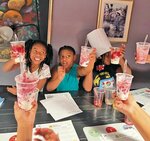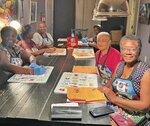

Despite Allendale County’s economy being based primarily on agriculture, members of the community struggle to get access to fresh, healthy food, as well as education about its importance.
The county has no shortage of fast food locations, gas stations and convenience stores. However, in terms of fresh foods, options are limited, especially for the Town of Fairfax, which has no grocery stores and is home to 1,482 people, according to the latest census. The county has one grocery store, IGA, located in the Town of Allendale along U.S. Route 278.
Although Allendale’s rural character and situation is unique, the issue of food deserts, food insecurity and malnutrition is widespread throughout the United States, particularly in the south. The situation is the result of the monopolization of the food industry, the lobbying of elected leaders by corporate agricultural firms and the historical redlining of neighborhoods where Black Americans have lived.
However, one community member — Lottie Lewis — is trying to turn things around for Allendale County. Lewis has been key in putting on the Allendale County Farmers Market, which brings fresh foods to the community on Thursdays, Fridays and Saturdays from 10 a.m. to 4 p.m. This summer, Lewis hosted a series of free cooking classes called “Cooking Matters,” aimed at educating children on the importance of healthy food. Additionally, Lewis wishes to launch larger scale efforts to bring Allendale County’s communities around healthy food.
The People-Sentinel spoke with Lewis about the educational, cultural and economic issues that Allendale’s local food system faces, as well as what can be done to improve it.
The following interview has been edited for length and clarity.
Elijah de Castro: I’m first hoping that you can tell me about the way that people get food in Allendale and the common difficulties that people have with food access.
Lottie Lewis: There are several challenges that we face. There’s problems of getting food to some folks, especially our elderly and our folks living in rural areas because most of them do not have transportation. One of the things that I’ve observed is that a lot of our folks, even if we get the food to them, they don’t know how to prepare it. There are certain vegetables and fruits that they don’t even know what they are. This generation has grown up on fast foods because that’s all they’ve known because of the economy. We have a lot of single parents, a lot of grandparents and a lot of children raising children, and they can only do what they know. You can follow some of the folks around the grocery store, which I have done occasionally, and look in their basket and you would see things like potato chips and candy and soda and honey buns and those kinds of things. So, our children are not learning to appreciate what vegetables and fresh foods taste like. They don’t go near that. Education is one of the crucial things that we need to be thinking about when we think about making our community healthy again. We are not accustomed to eating what’s good for us.
ED: It’s almost kind of ironic that Allendale County has such a huge agricultural economy, but most of it isn’t sold within the community, it’s sold on world markets as a commodity. That’s not the fault of our farmers of course, because they need to make ends meet and that’s the way the economy has been structured by lawmakers and the agricultural lobby. Can you tell me a little bit about that?
LL: You would think that because there’s all this farmland all around us, we could have healthy food for our community. We have a lot of farmland but the food doesn’t end up here, it goes someplace else. We need to change our mindset and it takes changing one element at a time.
ED: Can you tell me a little bit more about education? If I were someone who wanted to get young people involved more in eating healthy food and knowing that healthy food can taste good, I would want to be in those schools. But there’s often not the resources for that type of education.
LL: One of the things that I’ve done is that every summer I have cooking classes for adults and for children. I’ve been teaching people how to make healthy food, and showing them that it can taste really good and it’s easy to do. We’ve been having a lot of fun with that. I’m so glad we’ve had a lot of folks participate in the classes. That’s one of the ways that we can start. I worked closely with (former Allendale County Schools Superintendent) Dr. Gilmore on this because if you care, you have to be there. There’s a saying that you can give a man a fish and he can eat for a day, but if you teach him how to fish, he can eat for a long time. That’s my motto. The education part of it is missing in Allendale. We need to educate not just the children, but the adults as well.
ED: Community run co-ops and farms are something that are becoming more popular. Is that something that you would like to see in Allendale? And if so, people would probably first have to understand the value of something like that.
LL: Yes. People have to believe ‘Okay, this is going to be beneficial to me.’ To get the word out, those of us on the front line need to lead by example. I’m a firm believer that we need to do more than just lip service. We have to have leaders who say ‘This is what I’m presenting and let me show you how it works.’ We have to get the right people, the right leaders that are not only passionate about making this happen, but compassionate. There are seniors that are in desperate need of this. There are children that are in desperate need of this.
ED: I think for some people, healthy food and bringing the community together around it might be new. I grew up knowing people who had a consistent unhealthy diet that they attached personal emotions to. People can form connections with junk food beyond it being sugary and greasy, but also in their heart.
LL: That’s exactly right. That’s all some people know and we have to change that mindset. It’s hard to teach an old dog new tricks, which is why we have to start with our children now before it’s too late. But the adults in the classes that I’ve been giving, they’re so into it. It’s amazing the things that they’ve been cooking. Some of the things that they’re making are things that they’ve been making all the time but we’re showing them how to make it differently where you don’t have to have a ton of butter or a ton of sugar to make something taste good. In some cases, it tastes even better. They’re pleasantly surprised.
ED: I think a lot of people maybe even don’t know that that’s possible until they are presented with that. It seems like the way to approach that is by meeting people where they’re at, which is a really hard thing to do.
LL: Yes. You have to present it in a non-threatening, non-demanding way. That’s why I have the classes. I think if we had more classes in schools that would be a big help. It’s gonna take more than the little classes that I have. I would love, love, love to reach more people and if I could afford it, to have the classes as an ongoing thing. Word of mouth is a really strong way of communicating. I also think that our churches should get involved in this because churches often serve food, and it’s often things that taste so good, but it’s so unhealthy for us. I’m thinking about having a ‘We are the World’ type of a concert and serve some healthy foods and different things from different cultures.